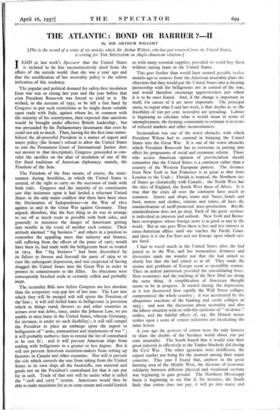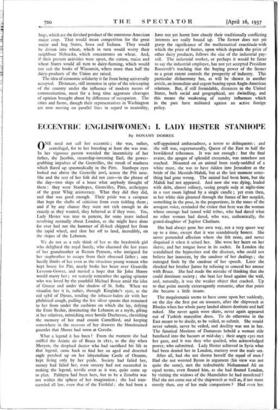THE ATLANTIC : BOND OR BARRIER ?
By SIR ARTHUR WILLERT
(This is the second of a series of six articles which Sir Arthur Willert, who has just returned from the United Stales, is writing for THE SPECTATOR on Anglo-American relations.] • ISAID in last week's Spectator that the United States is inclined to be less unconstructively aloof from the affairs of the outside world than she was a year ago and that the modification of her neutrality policy is the salient indication ,of this tendency.
The popular and political demand for safety-first insulation from war' was so strong last year and the year before that even President Roosevelt was forced to yield to it. He wished, in the autumn of 1935, to be left a free hand by Congress to put such restrictions as he might deem suitable upon trade with Italy, against whom he, in common with the majority of his countrymen, then expected that sanctions would be brought under effective British leadership ; but was persuaded by his Parliamentary lieutenants that even he could not ask so much. Then, having for the first time immo- bilised the all-powerful President in a matter of urgent and major policy (the Senate's refusal to allow the United States to join the Permanent Court of International Justice does not answer to that description), Congress proceeded to con- sider the sacrifice on the altar of insulation of one of the few fixed traditions of American diplomacy, namely, the Freedom of the Seas.
The Freedom of the Seas means, of course, the main- tenance during hostilities, in which the United States is neutral, of the right to carry on the maximum of trade with both sides. Congress and the majority of its constituents saw that insistence upon it had landed a reluctant United States in the only major conflicts that there have been since the Declaration of Independence—in the War of 1812 against us and in the Great War against Germany. They argued, therefore, that the best thing to do was to arrange to cut off as much trade as possible with both sides, and generally to minimise the danger of Americans getting into trouble in the event of another such contest. Their attitude alarmed " big business " and others in a position to remember the appalling mess that industry and finance, still suffering from the effects of the panic of 1907, would have been in, had trade with the belligerents been so treated in 1914. But " big business " had been discredited by its failure to foresee and forestall the panic of 1929 or to cure the subsequent depression, and was suspected of having dragged the United States into the Great War in order to protect its commitments to the Allies. Its objections were consequently brushed aside as certainly selfish and probably inept.
- The neutrality Bills now before Congress are less absolute than the temporary stop-gap law of last year. The Law into which they will be merged will still spurn the Freedom of the Seas ; it will still forbid loans to belligerents (a provision which as things stand, favours us and other countries in arrears over war debts, since, under the Johnson Law, we are unable to raise loans in the United States, whereas Germany, for instance, is under no such disability) ; it will still compel the President to place an embargo upon the export to belligerents of " arms, ammunition and implements of war " ; it will probably authoris: him to extend the list of contraband as he sees fit ; and it will prevent American ships from trading with belligerents to a greater or less degree. But it will not prevent American munition-makers from setting up factories in Canada and other countries. Nor will it prevent the side which controls the seas from taking from the United States in its own ships all the foodstuffs, raw material and goods not on the President's contraband list that it can pay for in cash. Trade of that sort will be under what is called the " cash and carry " system. Americans would thus be able to make munitions for us to some extent and could furnish us with many essential supplies, provided we could buy theta without raising loans in the United States.
This goes further than would have seemed possible twelve months ago to remove from the American neutrality plans the objection that they would put the United States into a sleeping partnership with the belligerents not in control of the seas, and would therefore encourage aggressiveness just where it is to be most feared. And, if the change is important in itself, the causes of it are more important. The principal cause, to repeat what I said last week, is that doubts as to the feasibility of 100 per cent. neutrality are spreading. Labour is beginning to calculate what it would mean in terms of unemployment, the farming community to estimate it in term.; of reduced markets and other inconveniences.
Sectionalism was one of the worst obstacles with which President Wilson had to contend in bringing the United States into the Great War. It is one of the worst obstacles which President Roosevelt has to overcome in putting into effect his programme of social and economic reform. Those who accuse American opinion of provincialism should remember that the United States is a continent rather than a country of the Western European pattern. The distance from New York to San Francisco is as great as that from London to the Urals ; Florida is tropical, the Northern tier of States go climatically with Canada ; the North West has the skies of England, the South West those of Africa. It is true that the cities all over the continent have much in common. Streets and shops, trams and 'buses, hotels and food, motors and clothes, stations and trains, all have the standardisation of tariff-protected mass-production. But the standardisation does not go deep. Each of the great sections is individual in interests and outlook. New York and Bostor have newspapers whose foreign news is as good as any in the world. But as one goes West there is less and less interest in extra-American affairs until one reaches the Pacific Coast, and there it is the Far East and not Europe upon which eyes are fixed.
I had to travel much in the United States after she had joined us in the War, and her tremendous distances and diversities made me wonder not that she had joined us slowly but that she had joined us at all. They made the strains and problems of Europe seem so incredibly remote. Then an ardent patriotism provided the consolidating force. Now economics and the teaching of the New Deal arc doing the same thing. A simplification of American thought seems to be in progress. It started during the depression, as it was discovered how rapidly the Wall Street collapse compromised the whole country ; it was accelerated by the ubiquitous reactions of the banking and credit collapse in 1933 ; and now the discussion about neutrality and also the labour situation with its wild-fire epidemic of " sit-down " strikes, and the baleful effects of, say, the Detroit motor strikes upon a score of remote industries are inculcating the same lesson.
A year ago the growers of cotton were the only farmers to share the doubts of the business world about ioo per cent. neutrality. The South feared that it would ruin their great industry as effectively as the Yankee blockade did during the Civil War. The other agrarians were indifferent, the export market not being for the moment among their major concerns. This year I found that, anyhow in the great farming area of the Middle West, the doctrine of economic solidarity between different physical and vocational sections was beginning to gain ground. The Northern Mississippi basin is beginning to see that if, for instance, the South finds that cotton does not pay, it will go into maize and hogs, which are the finished product of the enormous American maize crop. That would mean competition for the great maize and hog States, Iowa and Indiana. They would be driven into wheat, which in turn would worry their neighbour Nebraska, which concentrates on wheat. And, if their present activities were upset, the cotton, maize and wheat States would all turn to dairy-farming, which would not suit the books of Wisconsin, where more than half the dairy-products of the Union are raised.
The idea of economic solidarity is far from being universally accepted. Distances, still immense in spite of the telescoping of the country under the influence of modern means of communication, must for a long time aggravate cleavages of opinion brought about by difference of occupation. The cities and farms, though their representatives in Washington are now moving on parallel lines in regard to neutrality, have not. yet learnt how closely their traditionally conflicting interests are really bound up. The farmer does 'not pit grasp the significance of the mathematical exactitude with which the price of butter, upon which depends the price of other dairy products, follows the size of the industrial pay- roll. The industrial worker, or perhaps it would be fairer to say the industrial employer, has not yet accepted President Roosevelt's teaching that the buying power of the farmer to a great extent controls the prosperity of industry. This particular disharmony has, as will be shown in another article, an immediate and urgent bearing upon Anglo-American relations. But, if still formidable, distances in the United States, both social and geographical, are dwindling, and this means the weakening of sundry influences which in the past have militated against an active foreign policy.























































 Previous page
Previous page